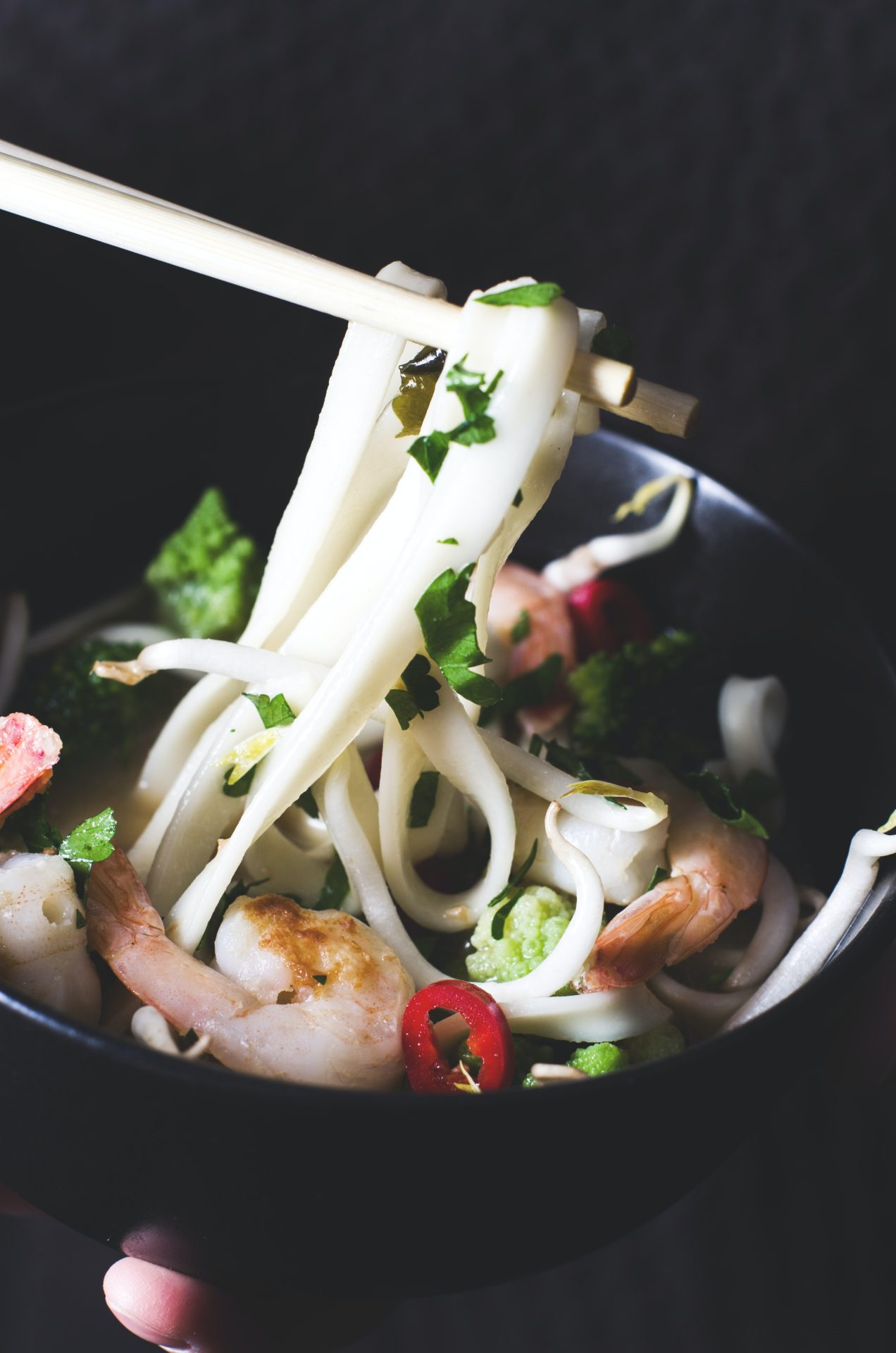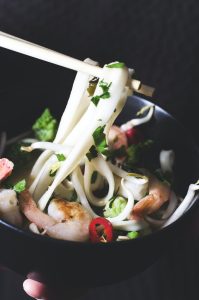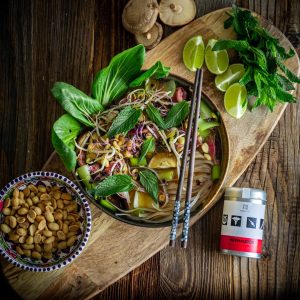Vietnamese cuisine is known for its balance of salty, sweet, sour, and spicy
flavors. Some of the traditional Vietnamese food include Phở noodle soup, Bun Cha, Cá
Kho Tộ, Bánh Xèo, and Gỏi Cuốn. In most Vietnamese food recipes, heaping amounts of
cilantro and mint, along with other spices, and vegetables are used in their dish.
Vietnamese cuisine is known for its usage of fish sauce, hoisin sauce, and soy sauce, as
well as other vegetarian options. Due to France colonizing Vietnam, this gave way to
pastry dishes such as the Bánh mì sandwich. This sandwich pays homage to the
baguettes in France.
Vietnamese food art refers to the practice of creating visually appealing and
artistic dishes using traditional Vietnamese ingredients and techniques. This can
include intricate designs made with fruits and vegetables, as well as the use of color
and texture to create a pleasing presentation. It is a way to elevate traditional dishes by
creating visually appealing and artistic plates that showcase the ingredients and
techniques of Vietnamese cuisine. One famous technique of Vietnamese food art is the
use of fruits and vegetables to create intricate designs and patterns. Another aspect of
Vietnamese food art is the use of traditional cooking techniques to create visually
interesting dishes. An example would be the Pho noodle soup. It is often served in a
large bowl with broth, noodles, meat, and vegetables arranged in an aesthetically
pleasing manner.
Gỏi Cuốn, also known as Vietnamese spring rolls is a popular and refreshing
appetizer in Vietnamese cuisine. They are made with thin rice paper wrappers filled with
a variety of ingredients such as cooked shrimp, pork, lettuce, herbs, and vermicelli
noodles. The rice paper wrapper is translucent and soft, and it is made from a mixture
of rice flour, water, and salt. To make the spring rolls, the rice paper wrapper is first
soaked in clean water for about ten to fifteen seconds until it becomes soft and flexible.
Afterward, the wrapper is filled with a small amount of shrimp, pork, vermicelli noodles,
lettuce, mint, cilantro, basil, and scallions. The wrapper is then rolled up tightly to form a
cylindrical shape. The rolls are often served with a dipping sauce called Nuoc Cham.
This sauce is made with fish sauce, sugar, lime juice, garlic, and chilies. It is a dish
served to those who want to lose weight.
Bánh Xèo is a traditional Vietnamese dessert that is also known as Vietnamese
crepes. It is made with a batter of rice flour, coconut milk, and turmeric that is poured into a hot skillet and cooked until crispy and golden brown. The crepe is usually filled
with a mixture of meats, seafood, and bean sprouts and then folded or rolled. It is
usually made in a holdable size so that it is easy to eat. It is a popular street food in
Vietnam.
Cá Kho Tộ is a traditional Vietnamese dish that is a type of braised or stewed
meat, usually pork or beef, that is cooked in a caramel sauce. The dish is known for its
rich and savory flavors, as well as its tender and meltingly soft meat. The caramel sauce
is made by caramelizing sugar in a pot until it turns a dark brown color, then adding fish
sauce, garlic, and shallots. The meat is then added and slow-cooked until tender. It is
known for its sweet and savory flavor and is a must-try food for tourists.
Bun Cha is a traditional Vietnamese dish that consists of grilled pork served over
a bed of vermicelli noodles. It is accompanied by a variety of herbs and greens, as well
as a dipping sauce made from fish sauce, sugar, lime juice, and garlic. The dish is
usually served with a side of pickled vegetables. The dish is known for its balance of
savory flavors and hearty textures. It is topped with tender grilled meatballs, served with
cool and refreshing herbs, and slightly chewy vermicelli noodles. It is a very popular
street food in Vietnam. It is enjoyed in afternoon meals with friends or family.
Phở noodle soup is a famous Vietnamese food known for its rich flavor. This
comforting dish is made with either beef or chicken broth, rice noodles, and a variety of
herbs and spices. The broth is made by simmering beef or chicken bones together with
onions, ginger, and spices such as cinnamon, star anise, and garlic cloves for several
hours. It is usually seasoned with fish sauce and soy sauce for the salty aspect of the
dish. The cooked broth is poured over the rice noodles in a bowl and served with thinly
sliced beef or chicken. Leafy herbs are used for garnish and lime wedges are served on
the side to add a sour twist to the dish. It is one of the dishes that would definitely make
the Kinh people feel at home.
Vietnamese cuisine can be derived from its geography, history, and culture. The
country’s long coastline and numerous rivers provide an abundance of seafood, while its
fertile farmlands yield a wide variety of fruits and vegetables. The cuisine also reflects
Vietnam’s history as a French colony, as seen in the Bánh mì sandwich, as well as its
neighboring countries such as China, Laos, and Cambodia, as seen in its rice and noodle
dishes. Vietnam’s geography also played a role in shaping the cuisine, with the north
having a more rustic and hearty cuisine, and the south being more refined and lighter.
This is due to the climate and availability of ingredients in each region. Vietnamese
cuisine also has a strong emphasis on the use of herbs, spices, and other flavorful ingredients, which reflects the country’s culture of valuing balance, harmony, and health.
All of these elements come together to create a diverse and unique cuisine that is
known for its balance of flavors and use of fresh ingredients.





